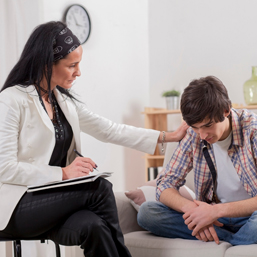
Due to the pandemic, the last couple years have been challenging for everyone’s mental health, especially teens. Some of my favorite memories of adolescence are hanging out with friends, going to the mall with friends, and playing sports with friends and classmates.
Lately, important freedoms that contribute to teen development in the areas of independence and individuation have been precarious. Parents contact me, worried about their teen’s well-being and ability to cope. Tired of feeling unmotivated and anxious, teens are asking for help with their mental health.
Like many, if you are trying to figure out whether to connect your teen to a mental health resource, like therapy or teen life coaching, here are four areas to take inventory of. If some of these areas are on shaky ground, therapy or teen life coaching may be beneficial to your teen.
How do you choose the right mental health resource for your teen?
When choosing a therapist or teen life coach for your teen, fit is your No. 1 priority. You and your teen want to choose someone they feel comfortable with, someone you can easily communicate with, and someone who is knowledgeable and passionate about teen issues.
You also want to think about how the sessions will unfold. When I was developing my practice, I thought about the ways I worked things out when I was a teen: walking with my best friend while venting about relationships and school stress, keeping a journal for poetry and art to let it all out, or blasting my music until the feelings passed.
Talk to your teen about their ideas and preferences. Here are a few options:
Walk-and-talk sessions. Your teen meets their therapist/teen life coach at a safe outdoor space and walks during their session. They can take breaks or walk the entire time.
This kind of support can be great if:
Expressive arts/art-based therapy. Expressive arts/art-based therapy is a way of supporting your teen to express, understand, and discover themself while using experiential mediums like painting, writing, drawing, photography, movement, music, crafting, etc. You don’t need to see yourself as an artist or even think you are creative to try this. When teens (and me!) use expressive arts in session, they are often surprised at what comes to their awareness.
This kind of support can be great:
Virtual sessions. Your teen can easily hop online from the comfort of home. If your teen has a private, cozy space, this may be a great option. It can be nice to have the family pet snuggle up to your teen or for them to be able to sit on their bed while wearing their favorite pajamas during their session.
Here are a few things for your teen to consider:
Group sessions. Meeting with peers can seem intimidating at first, but the benefits can be great. After bringing down the wall of nerves, groups can be an amazing platform for your teen to know they are not alone. Groups can build community, trust, and open doors to destigmatize thoughts, feelings, and experiences for its participants.
This kind of support can be great if:
Face-to-face sessions. Face to face provides a clear container for mental health support. The space is dedicated for this and once your teen leaves the session, they metaphorically leave some of that tough stuff in that space. Having a consistent, familiar space can feel comforting and safe. Knowing all they need to do is show up and everything will be there, familiar, can alleviate their additional stress.
You are doing the best you can, but it’s necessary that you don’t do it alone. Reaching out for support is a powerful parenting move that invests in your teen’s current and future well-being.
Good mental health
For a mental health eBook for teens, visit my website. This eBook has 10 mental health exercises every teen needs to know!
Raising a teen girl? Check out my free anxiety toolkit. You will receive 10 tools you can implement, and 7 daily mini webinars with more support.
Chantal Côté, psychologist and teen life coach, is on a mission to help teen girls build bulletproof mindsets. Founder of Pyramid Psychology and creator of the Stress Busting Bootcamp and The Happiness Pill Teen Life Coaching program, Chantal is passionately dedicated to supporting youth to find their strengths, self-love, and self-acceptance to begin thriving. Learn more by calling or texting 403-812-1716 or checking out pyramidpsychology.com.
Calgary’s Child Magazine © 2024 Calgary’s Child